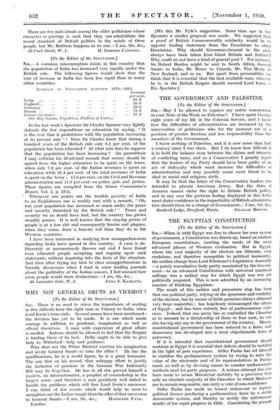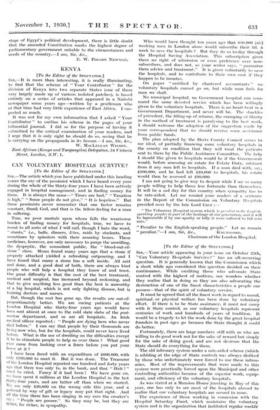THE EGYPTIAN CONSTITUTION
[To the Editor of the SPECTATOR.] SIR,—When in 1922 Egypt was free to choose her own system of government, a Constitution was drawn up, based on modern European constitutions, meeting the needs of the most advanced phases of Western civilization. But in Egypt, where the vast majority of the electors are illiterate, very credulous, and therefore susceptible to political insincerity, the sudden change from Lord Kitchener's Legislative Assembly —a purely consultative body partly nominated by the Govern- ment—to an advanced Constitution with universal manhood suffrage was a radical step for which Egypt was not yet politically prepared. This is now admitted by an increasing
number of thinking Egyptians. •
The result of this sudden and premature step has been that one political party, relying on the ignorance and credulity of the electors, has by means of futile promises always obtained very large majorities ; has hopelessly mismanaged the affairs of Egypt ; and has been entirely free of parliamentary criti- cism. Indeed, that one party has so controlled the Chamber as to amount to a dictatorship of three or four men, no one else having any say in the government of the country. Hence, constitutional government has been reduced to a farce, and democracy has developed into a most objectionable form of autocracy. If it is intended that constitutional government should continue in Egypt it is essential that defects should be rectified in the light of past experience. Sidky Pasha has set himself to stabilize the parliamentary system by trying to raise the value of the electorate and of its representatives in Parlia- ment, as well as by devising means to counter undemocratic methods used for party purposes. A serious attempt has also been made to secure Ministerial stability by a provision that only an absolute majority of the Chamber, to which Ministers are to remain responsible, can carry a vote of non-confidence.
Sidky Pasha has made an honest endeavour to replace political licence producing a parliamentary farce by a stable democratic system, and thereby to rectify the unfortunate results of too rapid progress in 1922. Considering the present stage of Egypt's political development, there is little doubt that the amended Constitution marks the highest degree of parliamentary government suitable to the circumstances and needs of the country.—I am, Sir, &c.,
E. W. POISON NEW .MAN.











































 Previous page
Previous page